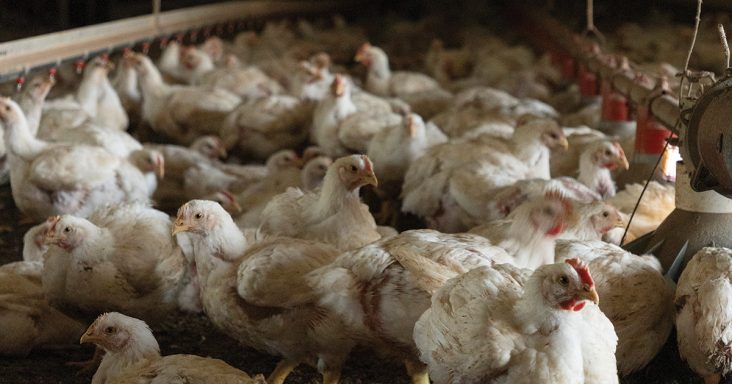Arkansas poultry sector challenged by disease, industry changes
by February 23, 2025 8:15 am 1,777 views

University of Arkansas file photo of broiler chickens taken at the Arkansas Agricultural Experiment Station's Savoy Research Complex in August 2023.
Arkansas’ largest industry is agriculture generating more than $21 billion annually in economic activity. Poultry, along with egg production, generates $6.7 billion in cash receipts in the state, the highest of any sub-sector within the industry, according to the Poultry Federation.
Much of the U.S. poultry sector has been plagued with the highly pathogenic avian influenza (HPAI), or bird flu, in recent years and spikes in egg prices are directly tied to the disease outbreak.
Fortunately for the Natural State, the disease has had a lesser impact on the state compared to others, Arkansas Agriculture Secretary Wes Ward said.
“Avian influenza has obviously had a big impact on the poultry industry as a whole. Thankfully, Arkansas has weathered that storm better than most,” he said. “About 50% of all cash receipts in the agricultural industry in Arkansas come from poultry.”
The outbreak of HPAI has infected more than 120 million birds nationwide since it began in 2022, according to the U.S. Department of Agriculture (USDA). The deadly virus was first detected in Arkansas in October 2022 and affected 56,000 commercial birds that year. In 2023, that number rose to over 255,000.
In 2024, the state had no commercial poultry HPAI detections, a trend with causes rooted in Arkansas’ production demographics, according to Jada Thompson, associate professor of agricultural economics and agribusiness for the University of Arkansas System Division of Agriculture.
“I think for Arkansas, we’ve been pretty lucky. … It hasn’t been as big of a direct impact on growers here,” she said.
She noted the outbreak’s impact is in large part based on poultry type. Poultry can be divided into broilers, layers and turkeys, with broilers being chickens for meat production, layers being chickens for egg production, and turkeys raised for meat production.
Arkansas has more broilers than layers or turkeys, and most outbreaks are where there are large concentrations of layers and turkeys. Thompson also attributed Arkansas’ decrease in HPAI detections to its climate and geographical location. The HPAI strain, H5N1, travels through wildlife along the wild bird flyways, with Arkansas in the Mississippi Flyway, but does not do as well in warmer environments like Arkansas, Thompson said.
The decrease in commercial infections does not mean Arkansas is out of the woods, according to Dustan Clark, extension poultry health veterinarian for the Division of Agriculture. In December, three positive HPAI detections were found in backyard flocks in Craighead, Lafayette, and Pope counties.
Despite much lower detection numbers during the last year, Clark said he’s urging others to practice biosecurity by recognizing signs of illness, refraining from bringing home animals suspected of being diseased and contacting appropriate service personnel, such as a local veterinarian, the Arkansas Livestock and Poultry Division, or USDA.
“Vigilance is key,” Clark said. “If you see something in your birds that just does not look right, get help.”
Turkeys raised nationally have gone down 6% since last year, according to the USDA’s Raised Turkeys report. Arkansas ranks third for turkey production and has not lost a commercial flock.
Poultry processing plant closures have also had an impact on the industry, Thompson said, with restructuring efforts leading to loss of jobs and canceled contracts for growers. In late 2023, Cooks Venture, a poultry company focused on raising a specialty chicken breed, closed unexpectedly, citing financial trouble and giving employees and stakeholders just days’ notice. Growers who had contracted with the business were left with chickens that were ultimately euthanized because they weren’t allowed to keep their birds.
“I think the concern is always the relationship between the grower and the integrator,” Thompson said of the conflict.
Butterball announced in December that it would shutter its Jonesboro plant after 19 years of operations in Northeast Arkansas. Cargill announced the closure of a major turkey processing facility in Springdale in January.
“I think right now, the new poultry companies that have been entering the markets are trying niche or specialty birds and markets, and sometimes it’s harder for those companies that have higher costs when you have an economic downturn,” Thompson said.
Several other poultry industry facilities have been shuttered in other states as well.
“I think the plant closures have been impactful this year,” Thompson said, citing restructuring within the U.S. poultry industry.
Larger, well-established companies oversee most poultry production phases such as feeding, slaughtering and processing, which also makes it harder for a new integrator or a new company to enter the market because of the large-scale efficiencies already in place, she said.
There isn’t much money to be made per individual bird, “which is why we go back to those small-scale producers and those new players in the market and why they may face financial challenges,” she said.
Thompson conducted a study with James Mitchell, assistant professor of agricultural economics and agribusiness, and Trey Malone, formerly with the Division of Agriculture and now the Boehlje Endowed Chair for Managerial Economics in Agribusiness at Purdue University, investigating the impacts of generational bird losses due to HPAI.
“It takes chickens close to a month to hatch and five months to get to sexual maturity, which means if you have a layer that gets depopulated because of HPAI, it’s six months before you have another layer in her place,” she said.
Thompson believes consumer prices within the industry are likely to be consistent in the coming months.
“I don’t see prices going down substantially. I think without some major external factor, I don’t think they’re going to go up either,” she said.
